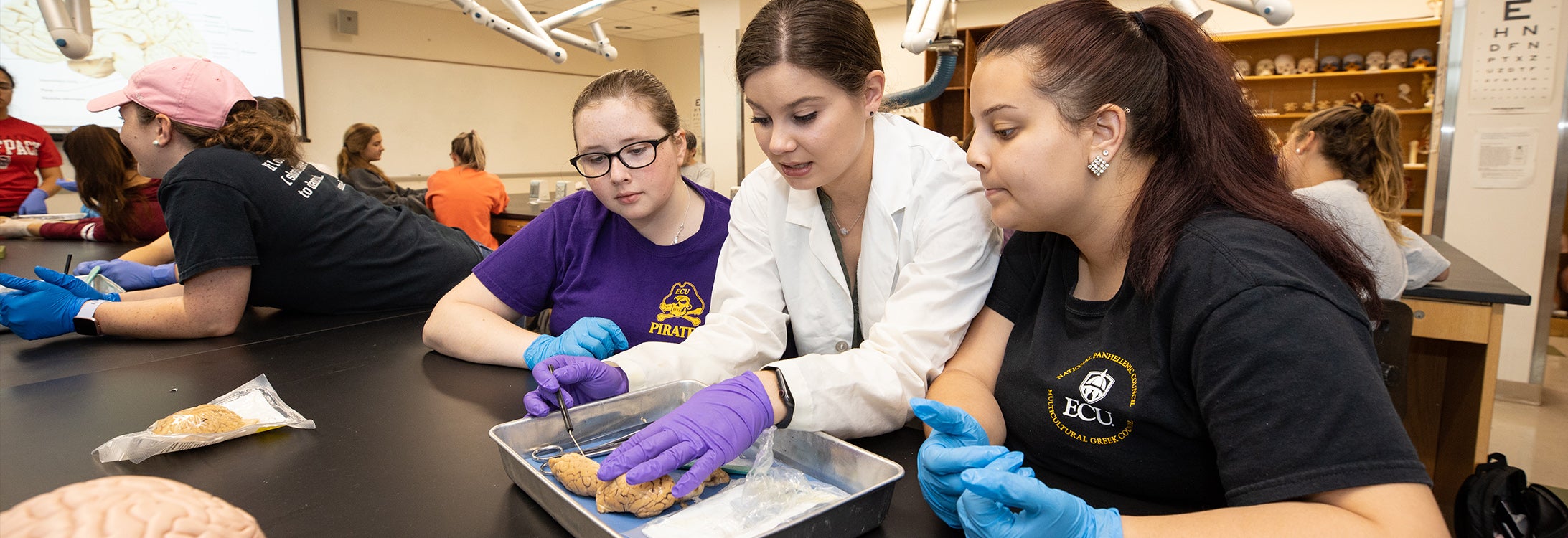COVID-19 Wet Lab Practices
The following recommendations are provided for wet laboratory practices for undergraduate research students under COVID-19, revised in March 2021.
Introduction
Undergraduate research is one of a number of high-impact practices recognized to support deep learning and cognitive development as well as important skills such as critical reasoning, oral and written communication, and presentation skills. ECU has a strong history of engaging undergraduate students in faculty or graduate-student mentored research. Indeed, many students derive a portion of their upper level course credits from credit-bearing independent study research courses. In some undergraduate majors, research is a required component for their degrees. Therefore, we are committed to providing students with opportunities for undergraduate research.
Overview and Audience
During the COVID-19 pandemic, faculty researchers have been mentoring student projects that are carried out remotely. However, for some projects, research must be done in a laboratory environment.
This document covers research that takes place in wet laboratories only (i.e. those with lab benches for physical experimentation) on east and west campuses and other locations at ECU. It does not cover other laboratories and non-laboratory research spaces. For guidelines on carrying out research with human subjects, please follow the guidelines in Human Research Guidance. For research in a field setting, please see the Fieldwork Research Guidance. For all situations, guidelines in the Return of the Pirate Nation should be followed with important changes as noted below. Finally, as all laboratory spaces are overseen by the Office of Environmental Health and Safety, their normal guidelines should be followed with additions as noted below.
Expectations for Laboratory Use
- Personal protective equipment (PPE) requirements for labs: lab coat, mouth and nose coverings (masks), face shields/or goggles and, if the lab does not generally provide them, single use gloves.
- Students experiencing symptoms associated with COVID-19 should notify their mentor by email or text and should not carry out laboratory work under any circumstances.
- All students should thoroughly wash their hands immediately prior to working in the lab, and at the end of time there. If hand-washing facilities are unavailable, an approved hand sanitizer should be used.
- Work areas and equipment should be disinfected by the student upon arrival, using disinfectant and procedures provided by the mentor.
- All students are required to maintain at least six (6) feet between individuals.
- For all laboratory workers, including students, time in the laboratory should be minimized to reduce opportunities for viral transmission. Students are fully prepared when they arrive in the laboratory, and the lab time is reserved to conduct the experiment or procedure. In person discussion with others including the mentor before and after the time in lab should be minimized.
- Depending on the number of laboratory workers, faculty mentors may need to set up a rotation schedule to limit the number of researchers who are working at the same time. The guideline of 50-100 sq. ft of clear (ie walkable) floor space per person should be followed. All laboratory workers should be considered. Phase Three guidelines with a target number of 50-75%% of maximum capacity should be followed as per the COVID research ramp up framework.
- As stated in the Return of the Pirate Nation, a log of laboratory personnel should be maintained.
Guidelines
Laboratories are clean spaces, and many of our laboratory practices, if well applied, make laboratories an acceptably safe environment. The COVID-19 pandemic, however, requires additional safety precautions regarding social distancing, PPE as well as surface and shared equipment decontamination. Some PPE are used for purposes of avoiding self-infection (gloves and eye coverings), and others for avoiding the spread of infection (mouth and nose masks). As asymptomatic individuals can infect others, all individuals should be treated as infectious.
Laboratories should be equipped with bottles of 70% ethanol, hand sanitizers and wipes. The recommended PPE requirements for labs in which students are routinely present are personal (purchased by the student, not to be shared) lab coat, masks, face shields/or goggles and, if the lab does not generally provide them, single use gloves. This will be the standard in most laboratory spaces and circumstances. It is recognized that adjustments must be made to training and other current laboratory practices to accommodate the 6 ft. of separation. For example, safety hoods designed to accommodate two people will likely only be used by one person during COVID-19.
Research Restart Form Revisions
As part of the Research Restart Smartsheet form, questions specific to undergraduate researchers should be answered before students begin. The questions include names of student researchers, rotation schedule if necessary and plans for student accommodation in non- laboratory areas (i.e. ancillary rooms with desk space). If a Research Restart Smartsheet form without students has been approved previously, a revised form will be required. The form has a box to request a revision to the previous submitted form. Once the new or revised form is completed, it will be routed to the chair and associate dean for approval.
